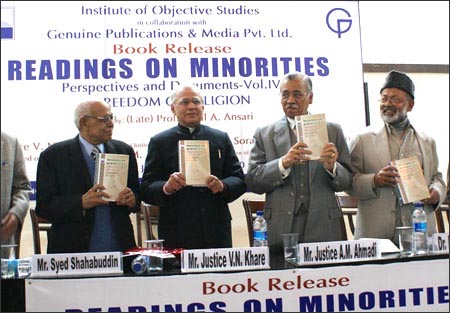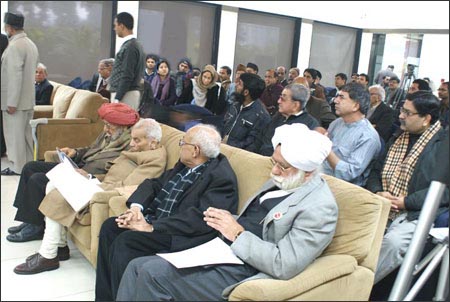|
Mr. Khan was speaking at a function organised by the Institute of Objective Studies at the Constitution Club to release late Prof. Iqbal A. Ansari’s book, Readings on Minorities: Freedom of Religion. It is the fourth and the last volume in Professors Ansari’s classic Readings on Minorities.
Echoing the concerns of Prof. Ansari, Mr. Khan said that law alone would not remove misgivings on such emotive issues, and the society as a whole would have to take initiative. Prof. Ansari wanted a fresh Hindu-Muslim covenant on contentious issues like Ayodhya, cow slaughter and religious conversion to assuage hurt sentiments and accommodate each other’s sensitivities.
Freedom of religion was not confined to conversion alone: it covered a wider gamut of issues related to freedom of belief and worship, Mr. Khan explained.
The book was released by Justice V.N. Khare, former Chief Justice of India.
Former Vice-Chancellor of Jamia Millia Islamia, Mr. Shahid Mehdi, said Prof. Ansari’s work was of enduring value. Mr. Mehdi sought to put the United Nations perspective on minorities’ rights. The international organisations focused more on ethnicity (like the Australian aborigines, the South American indigenous people, the North American Red Indians etc. being called minorities), while in India it was more a case of religious and linguistic minorities.
He said that once a colleague of his from the Indian Foreign Service asked him whether it was true that Islam offered non-Muslims a choice between conversion and slaughter. That showed the extent of misinformation on Islam.
Another pertinent point he made was that South Asia’s minority problem too should be studied as a macro picture. He said some efforts were already on to address issues at South Asia level.

A view of book release
Justice Rajinder Sachar said that he was in complete agreement with Prof. Ansari’s views. Prof. Ansari believed that the irritants in Hindu-Muslim problems were pretty small and could be managed. Justice Sachar quoted from Maulana Abul Kalam Azad to emphasise that the propaganda about forced conversion to Islam was not correct.
He also quoted from Swami Vivekananda that Islam conquering India by the force of the sword was a lie. It conquered people’s hearts by emancipating the marginalised castes from serfdom, the Swami had observed.
He also explained that his friends in the human rights movement had sent five persons each to South Asian countries who stayed there for sometime and studied their minority issues.
Former MP and diplomat Syed Shahabuddin observed that Prof. Ansari, who taught English literature at Aligarh Muslim University, ended up as a jurist who could have a dialogue with “both the bench and the bar” with great ease and confidence.
Syed Shahabuddin said Prof. Ansari was deeply perturbed over rising violence. He also advocated affirmative action to lift Muslims out of their present difficulties. The majoritarian perspective in the treatment of minority concerns was yet another source of worry for Prof. Ansari, he added.
Journalist Siddharth Vardarajan said that Prof. Ansari was deeply committed to human rights. He was always in touch with developments in cases like Maliana and Hashimpura massacres in UP, which were hanging fire even 23 years after those horrid episodes.
Mr. Vardarajan supported Prof. Ansari’s insistence on equal compensation to be paid to the kin of people killed in riots. For instance, the compensation paid to 1984 anti-Sikh riots victims should be the standard. In Gujarat some of the Muslim victims were paid as little as Rs. 2,000 for each person killed.

A view of audience
Prof. Ansari’s case for enactment of a genocide law in India was also supported by Mr. Vardarajan.
Mr. Vardarajan was emphatic about fixing accountability of police officers. He said laws should be amended to delete the requirement of government’s sanction before filing a criminal case against police officers. “A Police officer is discharging no official duty by indulging in rape, arson and murder”, he reasoned.
Former V-C Punjabi University, Dr. Amrik Singh, said that Prof. Ansari’s family should be requested to lend his papers to IOS for some time so that several of his unfinished works could be completed.
Institute of Objective Studies (IOS) Chairman, Dr. Mohammad Manzoor Alam, announced that Prof. Syed Jamaluddin had been appointed editor of Human Rights Today. Prof. Ansari was the founding editor of this fine journal, and he edited it till his last days.
Dr. Alam said that the IOS was scouting for young talent all over India to fill the gap left by the first generation of IOS stalwarts who had started leaving for their heavenly abode, one by one.
Judicial reforms were close to Prof. Ansari’s heart and the IOS had been working on it for some time. Seminars were scheduled for near future on topics Prof. Ansari deemed important, Dr. Alam said. His legacy would continue to inspire us, he concluded.
In his presidential remarks former Chief Justice of India, Justice A.M. Ahmadi, said, “You rarely come across people of such commitment to cause as Prof. Ansari. The like of him will be difficult to find”.
He said that the religious diversity of the country was not reflected in institutions of authority. Muslim representation in legislatures as well as in officialdom (in fact, across the board) was so low, and even shrinking, that affirmative action was a need today.
However, he regretted that every time the government thought of some remedial steps some groups bullied it into surrender, “forcing it to give up half way”. He wondered as to why the government displayed such lack of backbone.
He said he was not happy with the Communal Riots (Prevention and Rehabilitation of Victims) Bill in its present form as it relied too much on states that had often subverted justice. The “Centre must assume greater authority to make the law effective”, he added.
Earlier, IOS Secretary General, Prof. Z.M. Khan presented a brief description of IOS programmes and policies. Mr Kaleem Alam, CEO, Genuine Publications & Media Pvt. Ltd. (which has published the book) proposed a vote of thanks. The proceedings began with a recital of the Quran by Maulana Abdullah Tariq.
|